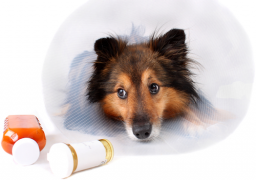Poop Therapy

Poop Therapy
We live in a world obsessed with clean. Our floors are scrubbed with antibacterial cleaners, we squirt hand sanitizer gel on our children’s hands and wipe down our kitchen counters with antibacterial wipes. Knowing this, you shouldn’t be surprised there was a big buzz when a poop transplant between a mother and her toddler son was used as treatment for a serious intestinal infection, Clostridium difficile.
Scientifically known as a fecal microbiota transplant, this unappealing therapy was a lifesaver for the sick child.
This veterinarian is not surprised
As a veterinarian, the concept of transplanting bacteria from a healthy patient to a sick patient is really nothing new. A “cud” transplant has long been used to transfer good bacteria to sick ruminant animals (sheep, goats and cows). Ruminants have a biochemically complex digestive process required to break down the dense plant material that forms their diet. The cud is a wad of partially digested food which returns to the mouth and is chewed a second time as part of this complex process. Veterinarians collect a cud from a healthy ruminant and feed it to sick one, transferring the healthy digestive tract bacteria much like the fecal microbiota transplant did in the sick toddler.
Fecal microbiota transplantation
Every living animal has its own microbiome on the skin and in the gastrointestinal tract. These endogenous bacteria help keep us healthy. Illness and antibiotic therapy disturb the normal bacterial and allow bad bacteria like C. difficile to proliferate and cause illness. Transplantation of bacteria takes several forms. The toddler received a fresh fecal transplant, but feces from a donor can be frozen for future use. There are even synthetic cultures of bacteria commonly found in the gastrointestinal tract. Transplantation of the good bacteria occurs via a nasogastric tube or by colonscopy.
A very recent study shows improvement in 79% of patients treated in this dramatic fashion.
Dogs and cats are lucky
Today, ruminants are the only veterinary patients receiving fecal microbiota transplant therapy; although pets sick enough to spend time in an ICU may contract C. difficile. Fortunately, this infection doesn’t happen as often as it does in human ICU patients.
Therapy dogs visiting human health care facilities have a greater risk of being colonized by C. difficile.
If your pet develops diarrhea following hospitalization or while taking antibiotics, be sure to tell your veterinarian as further testing may be required.
If your dog is a therapy dog, follow the healthcare guidelines and the visitation rules of your animal assisted therapy organization to protect your dog against this type of serious infection.


































